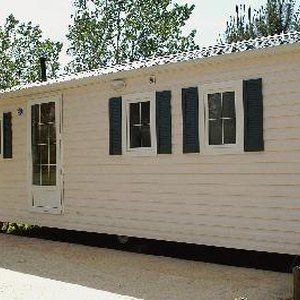
A mobile homes is an affordable choice for the homebuyer with a modest budget. The U.S. Department of Housing and Urban Development refers to mobile homes as manufactured homes, which it defines as a home built to its Manufactured Home Construction and Safety Standards, or HUD Code. Several financing options exist for mobile home buyers.
Personal Property Loan
A mobile home that doesn't qualify as real property, or real estate, may qualify for financing as personal property. This type of loan is similar to auto and boat loans and is appropriate for buyers who are purchasing a mobile home that will be set up on a leased lot. Although private lenders sometimes make these loans, the primary source is mobile-home retailers. Interest rates for personal-property loans are higher than are rates for mortgage loans.
Conventional Mortgage Loan
A mobile home built after June 15, 1976 and attached to a permanent foundation--HUD standards used for FHA, VA, Rural Housing and other government-backed loans and adopted by private lenders--is eligible for financing with a mortgage loan. The mobile home has to be on land the buyer owns or is purchasing, as ownership of the land makes the mobile home real property. A buyer may use a mortgage loan to purchase the mobile home or the lot or both. Loan options are the same for mobile homes as for site-built homes.
FHA Loan
The FHA insures mortgage loans for mobile homes on permanent foundations under two different programs. The Title I program allows buyers to purchase a home and lot or a lot only. The maximum loan amount for the home alone is $69,678 in 2011. The maximum for the home and lot is $92, 904. The maximum for a lot alone is $23,226. The maximum term for a single-wide mobile home and lot is 20 years; the maximum for a lot alone is 15 years. The FHA requires that the lot be appraised by a HUD-approved appraiser. The borrower must intend to live in the mobile home as his principal residence.
The Title II program is for the purchase of a mobile home and lot combination. The maximum term of the loan is 30 years, and it must cover both the home and the lot. The home's finished grade elevation must be above the 100-year flood mark.
VA Loan
Qualified veterans may use a VA-guaranteed loan to finance the lesser of the following: up to 95 percent of the purchase price; or the manufacturer's invoice price, adjusted for options the dealer adds or removes, plus the VA funding fee and certain other costs. An appraisal determines the maximum for a used mobile home or lot. The home must be the borrower's primary residence within a reasonable amount of time after closing. A single-wide mobile home alone qualifies for financing for up to 20 years and 32 days in 2011, and a mobile home and lot combination qualifies for a term of up to 23 years and 32 days. A lot alone, for a home the veteran already owns, qualifies for a maximum loan term of 15 years and 32 days. The loan also may be used for lot improvements.
Rural Housing
The Rural Housing Direct Loan Program, also referred to as a Section 502 loan, makes loans to low- and very-low-income buyers. A qualified Rural Housing borrower may finance 100 percent of the cost of an existing home, a lot and new construction, or a newly constructed home, whether site-built or manufactured, in a rural area. HUD designates the rural areas and sets income limits for the buyers. Terms of the loans are 30 years for mobile homes.
References
- Bankrate: Financing a Manufactured Home; Vikki Ramsey Conwell; July 22, 1999
- MortgageFit: Mobile Home Loans--How to Qualify and What Are the Options?; Jessica Bennet
- HUD: Financing Manufactured (Mobile) Homes
- HUD: Manufactured Housing and Standards: General Program Information
- HUD: Maufactured Homes: Eligibility and General Requirements--Title II
- HUD: Manufactured Home Loan Insurance (Title I)
- US Census Bureau. “MHS Latest Data.” Accessed Oc. 3, 2020.
Writer Bio
Daria Kelly Uhlig began writing professionally for websites in 2008. She is a licensed real-estate agent who specializes in resort real estate rentals in Ocean City, Md. Her real estate, business and finance articles have appeared on a number of sites, including Motley Fool, The Nest and more. Uhlig holds an associate degree in communications from Centenary College.

